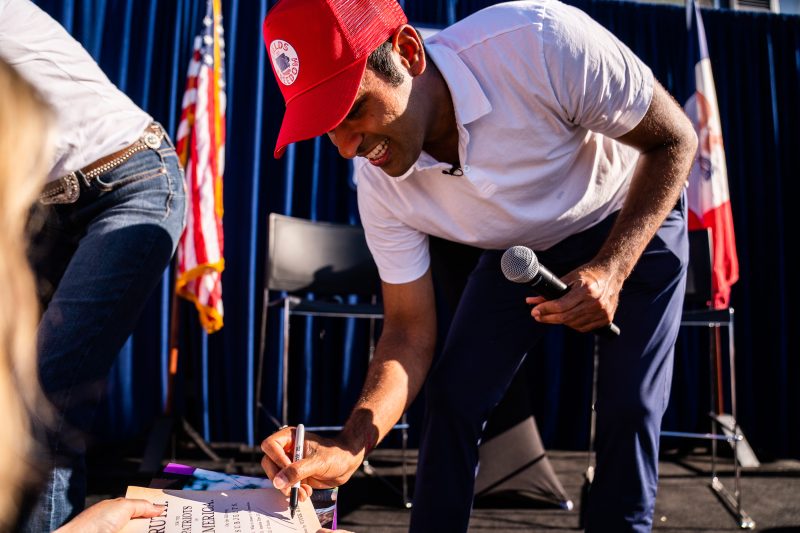Biotechnology entrepreneur Vivek Ramaswamy, a wild-card candidate with no previous experience in elected office, will stand center stage at the first Republican presidential debate in Milwaukee on Wednesday.
He is polling at about 9 percent, behind former president Donald Trump and Florida Gov. Ron DeSantis in the crowded field.
Here’s what we know about Ramaswamy’s history and policy positions.
Ramaswamy, 38, is a biotech entrepreneur and a frequent guest on Fox News. He worked briefly in investment banking before launching his own company, Roivant Sciences, in 2014. His business model centered on seeking to revive unwanted drugs from larger pharmaceutical companies.
Ramaswamy built his personal wealth at Roivant, as well as his dislike of political correctness. Among his three books is one called “Woke Inc.: Inside Corporate America’s Social Justice Scam,” in which he argues against corporate diversity and equity policies, as well as environmental protection policies.
The son of Indian immigrants, Ramaswamy attended a Jesuit Catholic high school in Cincinnati, Harvard College and Yale Law School. He and his wife, Apoorva Tewari Ramaswamy, a doctor, live near Columbus, Ohio, with their two children.
Among his interests: Rapping. He used to dress in all black and rap “libertarian prose” under the name “Da Vek” while at Harvard, the Harvard Crimson reported in 2006.
Under the tagline of “America First 2.0,” Ramaswamy is campaigning on the idea that Trump did not do enough to enact his policy agenda while in office. Ramaswamy’s platform relies heavily on executive actions. It also includes proposals that he says he wants to implement “without the permission or forgiveness of Congress” and that some experts have said would stretch the boundaries of presidential authority.
At the center of Ramaswamy’s policy proposals are a rejection of affirmative action and support for the idea that his millennial generation focuses on race to the point that “we forgot all of the ways that we are really just the same.” He has also emphasized a desire to stop corporations from measuring their performance in part by environmental, social and governance, or ESG, considerations.
Other tenets of his pitch include shutting down the FBI and the Education Department, sending U.S. armed forces to the Mexican border and cutting 75 percent of executive-branch employees. He also supports raising the voting age to 25 unless those young Americans serve in the military or as first responders, or they pass a citizenship test.
A list of people he has said he would consider nominating to the Supreme Court includes Sens. Mike Lee (R-Utah) and Ted Cruz (R-Tex.).
In response to a questionnaire from then-Fox News host Tucker Carlson, Ramaswamy said in March that opposing Russia’s war in Ukraine is not a crucial U.S. interest. He said the United States should be pushing “the Europeans to take care of themselves.”
“If I were president right now, I would limit any further funding or support to Ukraine,” he added.
Ramaswamy also said helping Ukraine makes the United States weaker relative to China.
“China wants the Ukraine war to last as long as possible to deplete Western military capacity before invading Taiwan,” he tweeted in June.
Ramaswamy has sought to walk a fine line between supporting Trump and running against him. He has pitched himself as the next iteration of the former president and said his path to the nomination is “alongside Trump.”
“The way I look at it, it’s not two cars on a collision course. It’s two cars on a racetrack alongside and we’re going to pass in the left lane — or the right lane, as the case may be here,” he said in a May interview while traveling between campaign stops in Iowa.
Tricia McLaughlin, a spokeswoman for Ramaswamy, declined to say directly whether the candidate accepts that Joe Biden legitimately won the 2020 presidential election. She said Ramaswamy thinks technology companies interfered in the election, “including systematic and coordinated suppression of the Hunter Biden laptop story.”
Previously, however, Ramaswamy criticized Trump for refusing to accept that he lost.
“The election was done, and it was time to move on,” he wrote in his book, “Nation of Victims: Identity Politics, the Death of Merit, and the Path Back to Excellence.” “We fought, we lost, and I accepted the result.”
Ramaswamy has advocated against the prosecution of Trump for his involvement in the Jan. 6, 2021, attack on the U.S. Capitol. He has also said he would pardon Trump if the former president were convicted of the charges he faces related to his alleged hiding of classified documents.
Trump has spoken positively about Ramaswamy and referenced him while theorizing that DeSantis would not be polling second in the Republican primary race for long.
“I wonder who it is going to be,” Trump said in July. “Maybe it’s Vivek, Vivek, could be. Could be. He’s doing well.”
Steven Mufson, Joanna Slater, Michael Birnbaum and Dylan Wells contributed to this report.

